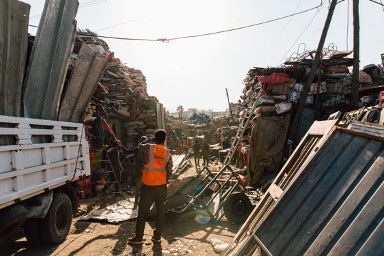Answering Your Questions About Scrap Metal: Frequently Asked Questions
If you have never recycled scrap metal yourself before, then you may not know exactly where to begin. At DJJ, we are committed to promoting sustainability through rigorous standards when it comes to scrap metal recycling. We help keep businesses in motion with a fluid transportation network and make it easy for consumers and industrial partners to drop off their unwanted scrap. Check frequently asked questions about scrap metal recycling and learn how to get started with DJJ.
What does DJJ recycle? What metals do we accept?
DJJ recycles all types of ferrous and non-ferrous scrap metal. We service both commercial and consumer needs both domestic and international, so anyone can visit one of our local scrap metal recycling partners and get rid of any unwanted metals.
Where can I sell scrap metal?
DJJ is a network of over 60 scrap recycling facilities across the United States with locations in every region. Find your local scrap mill and get started!
What are the benefits of scrap metal recycling?
There are several advantages to recycling metals, including both ferrous and non-ferrous options. Scrap metal recycling not only helps the environment by contributing to sustainable practices, but it also keeps businesses running smoothly.
Scrap metals are finite resources, comprised of elements that are mined from the earth. This requires precious time, labor, and monetary costs. Rather than manufacturing products from raw ore—starting again from scratch—manufacturers can use recycled metals to streamline the process. This minimizes energy and water consumption as well.
Mining also contributes to air, soil, and groundwater pollution, which has lasting impacts on the surrounding ecosystems. Scrap metal recycling reduces environmental impact, improving sustainability so that these operations can continue to exist for as long as they are needed.
Even at its simplest form, scrap metal recycling keeps metals out of landfills so that they can be properly disposed of when you are finished using them.

What happens to scrap metal after I sell it?
Metal recyclers, like DJJ, understand that it is not just the act of taking your metal to a local recycler that completes the transaction, but the process of recycling metal as a whole. DJJ’s many local metal recycling plants are located in geographic areas that are accessible from land, water, and railway, so that once your scrap metal is dropped off, it can efficiently move on to the next step of its’ life.
Once your scrap metal is dropped off at your nearest recycler, it is sorted into ferrous and non-ferrous metals, which make it easier to distinguish value and usability. After sorting, this scrap metal is thoroughly clean and purified, then melted down into useable product that can be again used in manufacturing.
How much is scrap metal worth?
Choosing to recycle your scrap metal gets unwanted waste off your hands and can make you a little extra cash. While all metal is valuable to recyclers, some pay more than others because of how difficult they can be to mine and manufacture.
Ferrous metals are the most valuable. These precious metals are more difficult to come by and are incredibly popular in manufacturing, including shipping containers, automobiles, industrial piping, and more. Some common examples of these valuable metals are copper, brass, silver, aluminum, stainless steel, gold, and lead.
MORE QUESTIONS?
Didn’t find the answers you were looking for? Feel free to contact us with your questions and business inquiries or find your nearest metal recycling plant and join our commitment to sustainability.